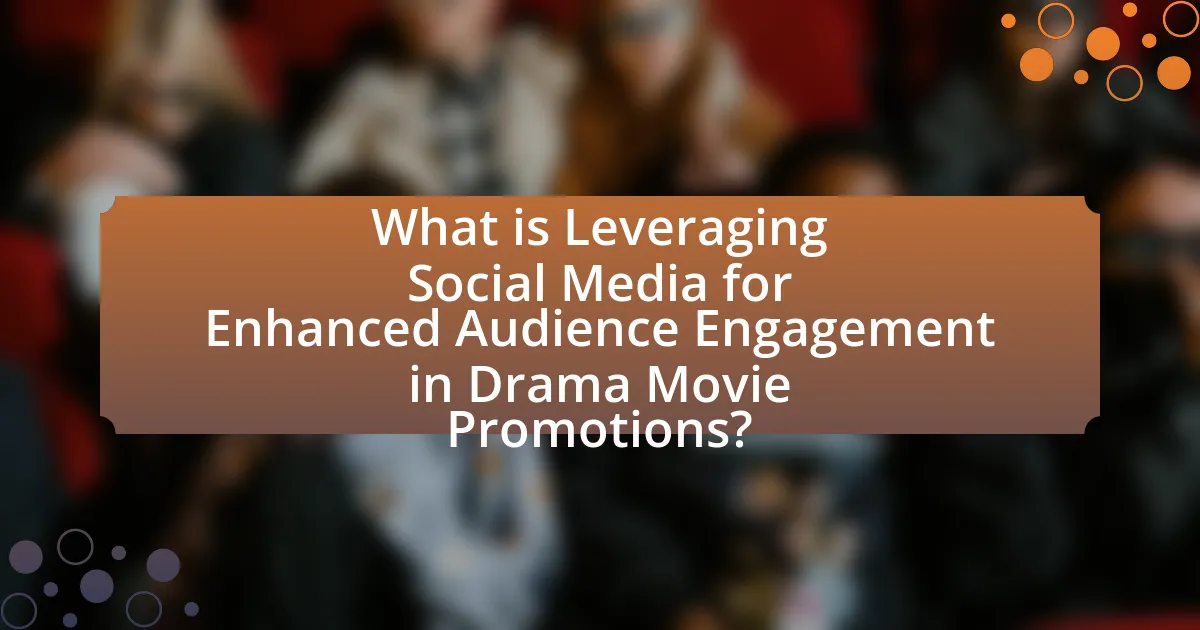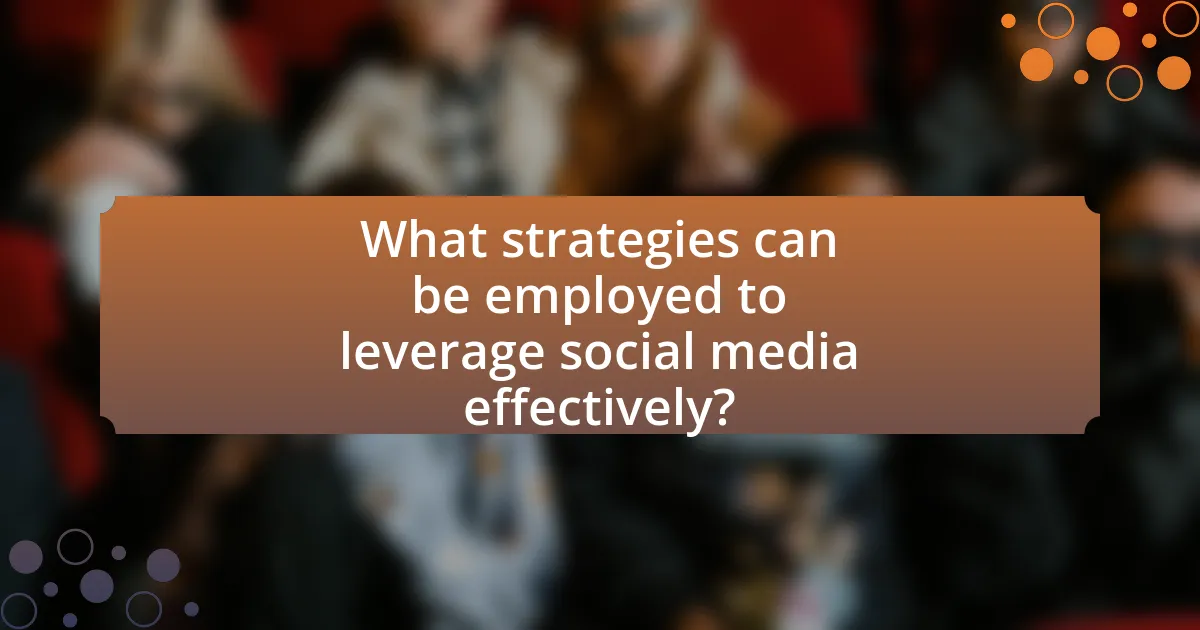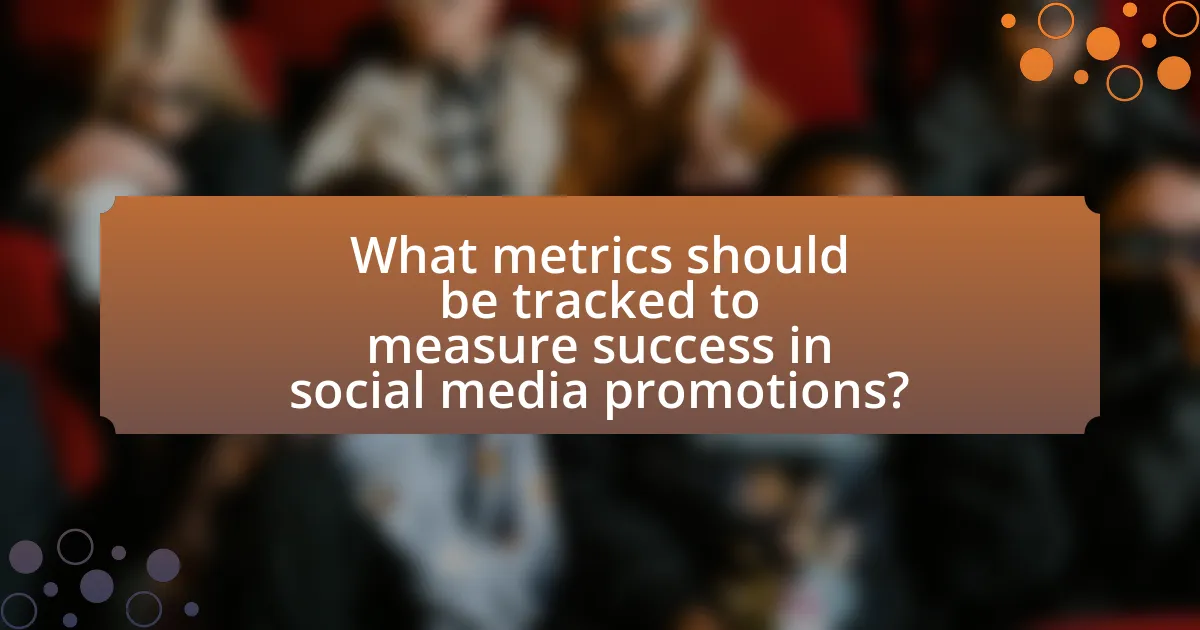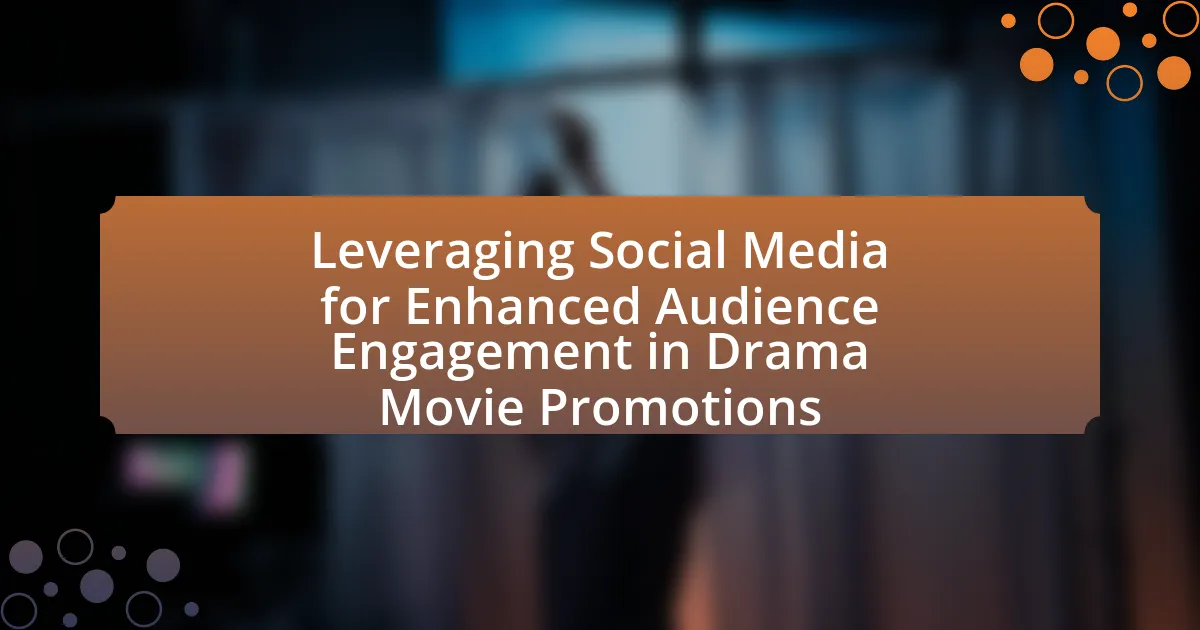Leveraging social media for enhanced audience engagement in drama movie promotions is a strategic approach that utilizes platforms such as Facebook, Instagram, Twitter, and TikTok to connect with potential viewers. The article explores how filmmakers can create interactive content, engage with audiences through polls and Q&A sessions, and utilize targeted advertising to reach specific demographics. It highlights the importance of audience engagement in driving box office performance and brand loyalty, while also discussing the role of influencers and effective content creation strategies. Additionally, the article addresses challenges faced in social media promotions and offers best practices for maximizing engagement and measuring success through key metrics.

What is Leveraging Social Media for Enhanced Audience Engagement in Drama Movie Promotions?
Leveraging social media for enhanced audience engagement in drama movie promotions involves utilizing platforms like Facebook, Instagram, and Twitter to create interactive content that resonates with potential viewers. This strategy includes sharing behind-the-scenes footage, engaging with fans through polls and Q&A sessions, and using targeted advertising to reach specific demographics. For instance, a study by the Pew Research Center indicates that 69% of adults in the U.S. use social media, making it a vital tool for reaching a broad audience. Additionally, campaigns that incorporate user-generated content can increase engagement rates significantly, as seen in the promotion of films like “The Blair Witch Project,” which effectively used social media to build anticipation and community involvement prior to its release.
How does social media influence audience engagement in drama movie promotions?
Social media significantly enhances audience engagement in drama movie promotions by facilitating direct interaction between filmmakers and potential viewers. This interaction occurs through platforms like Instagram, Twitter, and Facebook, where trailers, behind-the-scenes content, and interactive posts can be shared, generating buzz and anticipation. For instance, a study by the Pew Research Center found that 69% of adults in the U.S. use social media, making it a vital channel for reaching a broad audience. Additionally, social media allows for real-time feedback and discussions, enabling filmmakers to gauge audience reactions and adjust marketing strategies accordingly. This dynamic engagement fosters a sense of community among fans, further amplifying interest and participation in the promotional activities surrounding drama films.
What are the key social media platforms used for drama movie promotions?
The key social media platforms used for drama movie promotions are Facebook, Instagram, Twitter, and TikTok. These platforms enable filmmakers and studios to reach diverse audiences through targeted advertising, engaging content, and interactive features. For instance, Facebook’s extensive user base allows for broad outreach, while Instagram’s visual focus is ideal for sharing trailers and behind-the-scenes content. Twitter facilitates real-time engagement and discussions, and TikTok’s short-form video format is effective for viral marketing campaigns. Collectively, these platforms enhance audience engagement and drive interest in drama films.
How do different demographics interact with social media during movie promotions?
Different demographics interact with social media during movie promotions in distinct ways, influenced by factors such as age, gender, and cultural background. For instance, younger audiences, particularly those aged 18-34, tend to engage more actively on platforms like Instagram and TikTok, utilizing features such as stories and reels to share content related to movie promotions. In contrast, older demographics, such as those aged 35 and above, often prefer Facebook and Twitter, where they engage through posts and discussions.
Research indicates that 71% of millennials and Gen Z use social media to discover new movies, while only 38% of older generations report the same behavior (Pew Research Center, 2021). Additionally, gender differences emerge, with women more likely to engage with promotional content that emphasizes emotional storytelling, while men may respond better to action-oriented marketing. This demographic variation highlights the necessity for tailored social media strategies in movie promotions to effectively reach and engage diverse audience segments.
Why is audience engagement crucial for drama movie promotions?
Audience engagement is crucial for drama movie promotions because it directly influences the film’s visibility and audience reach. Engaging potential viewers through social media platforms creates a community around the film, fostering discussions and generating buzz that can lead to increased ticket sales. According to a study by the American Film Institute, films that actively engage audiences on social media platforms see a 30% higher box office performance compared to those that do not. This engagement not only builds anticipation but also encourages word-of-mouth marketing, which is vital in the competitive film industry.
What impact does audience engagement have on box office performance?
Audience engagement significantly enhances box office performance by driving ticket sales and increasing viewer interest. Engaged audiences are more likely to share their experiences on social media, leading to organic promotion and word-of-mouth marketing, which can boost attendance. For instance, a study by the Motion Picture Association found that films with high social media engagement saw an average increase of 20% in box office revenue compared to those with lower engagement levels. This correlation indicates that effective audience engagement strategies, particularly through social media, can directly influence a film’s financial success.
How does audience engagement affect brand loyalty for film studios?
Audience engagement significantly enhances brand loyalty for film studios by fostering a deeper emotional connection with viewers. When studios actively interact with their audience through social media platforms, they create a sense of community and belonging, which encourages viewers to develop a stronger attachment to the brand. Research indicates that 70% of consumers feel more connected to brands that engage with them on social media, leading to increased loyalty and repeat viewership. This connection is further reinforced when studios respond to audience feedback and incorporate viewer preferences into their marketing strategies, resulting in a more personalized experience that resonates with fans.

What strategies can be employed to leverage social media effectively?
To leverage social media effectively, drama movie promotions should utilize targeted advertising, engaging content creation, and audience interaction. Targeted advertising allows filmmakers to reach specific demographics, increasing the likelihood of engagement; for instance, Facebook’s ad platform enables precise targeting based on user interests and behaviors. Engaging content creation, such as behind-the-scenes footage or interactive polls, fosters a deeper connection with the audience, as evidenced by a study from the Content Marketing Institute, which found that 70% of consumers prefer to learn about products through content rather than traditional advertising. Lastly, audience interaction through comments, live Q&A sessions, and user-generated content encourages community building and enhances viewer loyalty, as demonstrated by successful campaigns from major film studios that actively engage their followers.
How can content creation enhance audience engagement on social media?
Content creation enhances audience engagement on social media by providing valuable, relatable, and entertaining material that resonates with users. Engaging content, such as behind-the-scenes footage, interactive polls, and user-generated content, encourages audience participation and fosters a sense of community. According to a study by HubSpot, 54% of consumers want to see more video content from brands they support, indicating that dynamic content formats can significantly boost interaction rates. Furthermore, consistent and high-quality content can lead to increased shares and comments, amplifying reach and visibility. This engagement not only strengthens brand loyalty but also drives conversations around the promoted drama movies, ultimately enhancing their visibility and success in the market.
What types of content resonate most with audiences in drama movie promotions?
Emotional storytelling content resonates most with audiences in drama movie promotions. This type of content effectively captures the essence of the film, allowing viewers to connect with characters and themes on a personal level. Research indicates that trailers featuring strong emotional arcs and character-driven narratives generate higher engagement rates, with a study by the Motion Picture Association revealing that 70% of audiences are more likely to watch a film after viewing a trailer that emphasizes emotional depth. Additionally, behind-the-scenes footage and interviews with cast members discussing their characters can enhance audience connection, as these elements provide insight into the film’s emotional landscape.
How can storytelling be utilized in social media campaigns for drama movies?
Storytelling can be utilized in social media campaigns for drama movies by creating engaging narratives that resonate emotionally with the audience. This approach allows filmmakers to share behind-the-scenes content, character backstories, and thematic elements that deepen viewer connection. For instance, campaigns can feature serialized video clips or posts that unfold a story over time, encouraging audience interaction and anticipation. Research indicates that emotional storytelling can increase audience engagement by up to 65%, as it fosters a sense of community and shared experience among viewers.
What role do influencers play in promoting drama movies on social media?
Influencers play a crucial role in promoting drama movies on social media by leveraging their large followings to create buzz and engage potential audiences. They utilize platforms like Instagram, Twitter, and TikTok to share trailers, behind-the-scenes content, and personal reviews, which can significantly increase visibility and interest in the films. For instance, a study by the Digital Marketing Institute found that 49% of consumers depend on influencer recommendations when making purchase decisions, highlighting the effectiveness of influencers in shaping audience perceptions and driving ticket sales for drama movies.
How can partnerships with influencers increase audience reach?
Partnerships with influencers can significantly increase audience reach by leveraging their established follower base and credibility. Influencers often have dedicated audiences that trust their recommendations, which can lead to higher engagement rates and expanded visibility for the promoted content. For instance, a study by the Digital Marketing Institute found that influencer marketing can yield an ROI of up to 11 times the investment, demonstrating its effectiveness in reaching new audiences. By collaborating with influencers, brands can tap into niche markets and enhance their promotional efforts, ultimately driving more traffic and interest in drama movie releases.
What are the best practices for collaborating with influencers in film promotions?
The best practices for collaborating with influencers in film promotions include selecting influencers whose audience aligns with the film’s target demographic, establishing clear communication regarding expectations and deliverables, and creating authentic content that resonates with both the influencer’s followers and the film’s themes. Research indicates that 49% of consumers depend on influencer recommendations, highlighting the importance of choosing influencers who genuinely connect with the film’s message. Additionally, providing influencers with exclusive content or behind-the-scenes access can enhance their engagement and authenticity, further driving audience interest and participation.

What metrics should be tracked to measure success in social media promotions?
To measure success in social media promotions, key metrics include engagement rate, reach, impressions, conversion rate, and follower growth. Engagement rate quantifies interactions (likes, shares, comments) relative to total followers, indicating audience interest. Reach measures the total number of unique users who see the content, while impressions count how many times the content is displayed, regardless of clicks. Conversion rate tracks the percentage of users who take a desired action, such as purchasing tickets or signing up for newsletters, reflecting the effectiveness of the promotion. Follower growth indicates the increase in audience size over time, showcasing the campaign’s ability to attract new viewers. These metrics provide a comprehensive view of promotional effectiveness and audience engagement.
How can engagement metrics inform future promotional strategies?
Engagement metrics can inform future promotional strategies by providing insights into audience preferences and behaviors. Analyzing metrics such as likes, shares, comments, and click-through rates allows marketers to identify which content resonates most with their audience. For instance, a study by HubSpot found that posts with higher engagement rates lead to increased brand awareness and customer loyalty, indicating that understanding these metrics can guide the creation of more effective promotional content. By leveraging this data, marketers can tailor their strategies to enhance audience engagement, ensuring that future campaigns are more aligned with viewer interests and ultimately more successful.
What specific metrics should be monitored for drama movie promotions?
The specific metrics that should be monitored for drama movie promotions include engagement rate, reach, impressions, click-through rate (CTR), and conversion rate. Engagement rate measures how actively audiences interact with promotional content, indicating interest levels. Reach quantifies the total number of unique users who see the content, while impressions count the total views, providing insight into visibility. Click-through rate assesses the effectiveness of calls to action, showing how many users take the desired action after viewing the promotion. Conversion rate tracks the percentage of users who complete a specific action, such as purchasing tickets, reflecting the overall success of the promotional campaign. Monitoring these metrics allows for data-driven adjustments to enhance audience engagement and optimize promotional strategies.
How can audience feedback be utilized to improve social media strategies?
Audience feedback can be utilized to improve social media strategies by analyzing user interactions and preferences to tailor content more effectively. By collecting data from comments, likes, shares, and direct messages, marketers can identify what resonates with the audience, allowing for adjustments in messaging, visuals, and posting times. For instance, a study by Sprout Social found that 70% of consumers are more likely to engage with brands that respond to their feedback, highlighting the importance of active engagement. This data-driven approach enables marketers to refine their strategies, ensuring that promotional content for drama movies aligns with audience interests and enhances overall engagement.
What are the common challenges faced in leveraging social media for drama movie promotions?
Common challenges faced in leveraging social media for drama movie promotions include audience saturation, content differentiation, and platform algorithm changes. Audience saturation occurs when numerous films compete for attention, making it difficult for any single drama movie to stand out. Content differentiation is crucial, as unique and engaging content is necessary to capture the interest of potential viewers amidst a sea of similar promotions. Additionally, frequent changes in social media algorithms can limit the organic reach of promotional posts, reducing visibility and engagement. These challenges necessitate strategic planning and innovative approaches to effectively promote drama movies on social media platforms.
How can negative feedback on social media be managed effectively?
Negative feedback on social media can be managed effectively by promptly acknowledging the feedback and responding professionally. Research indicates that timely responses can mitigate the impact of negative comments, as 70% of consumers expect a response within 24 hours. Engaging with the feedback demonstrates that the brand values customer opinions, which can enhance reputation and trust. Additionally, addressing the concerns raised in the feedback and offering solutions or clarifications can turn a negative experience into a positive one, fostering a sense of community and loyalty among the audience.
What strategies can be implemented to overcome low engagement rates?
To overcome low engagement rates in drama movie promotions on social media, implementing targeted content strategies is essential. These strategies include creating high-quality, visually appealing content that resonates with the target audience, utilizing storytelling techniques to connect emotionally, and leveraging user-generated content to foster community involvement. Research indicates that posts with images receive 94% more views than text-only posts, highlighting the importance of visual elements in engagement. Additionally, engaging with followers through comments and direct messages can increase interaction rates, as studies show that brands responding to comments can see a 20-40% increase in engagement.
What are the best practices for maximizing audience engagement in drama movie promotions?
The best practices for maximizing audience engagement in drama movie promotions include utilizing targeted social media campaigns, creating interactive content, and leveraging influencer partnerships. Targeted social media campaigns allow filmmakers to reach specific demographics, increasing the likelihood of engagement; for instance, Facebook and Instagram ads can be tailored to users’ interests and behaviors. Creating interactive content, such as polls, quizzes, and behind-the-scenes footage, encourages audience participation and fosters a sense of community around the film. Additionally, collaborating with influencers who resonate with the target audience can amplify reach and credibility, as studies show that 49% of consumers depend on influencer recommendations for their purchasing decisions. These strategies collectively enhance visibility and engagement, driving interest in the drama movie.
How can regular interaction with followers enhance engagement?
Regular interaction with followers enhances engagement by fostering a sense of community and loyalty. When brands or individuals consistently communicate with their audience, it encourages followers to participate actively, share their thoughts, and feel valued. Research indicates that brands that engage with their audience through comments, direct messages, and interactive content see a 20-40% increase in engagement rates. This interaction not only boosts visibility but also strengthens the emotional connection between the audience and the brand, leading to higher retention and advocacy.
What innovative techniques can be used to captivate audiences on social media?
Innovative techniques to captivate audiences on social media include interactive storytelling, live streaming events, and user-generated content campaigns. Interactive storytelling engages users by allowing them to influence the narrative, which can increase emotional investment; for example, platforms like Instagram and TikTok enable creators to share episodic content that invites audience participation. Live streaming events, such as Q&A sessions with cast members or behind-the-scenes tours, create real-time engagement and foster a sense of community among fans. User-generated content campaigns encourage audiences to share their own stories or interpretations related to the drama movie, enhancing relatability and expanding reach. According to a study by the Content Marketing Institute, 70% of consumers prefer to learn about products through content rather than traditional advertising, highlighting the effectiveness of these techniques in engaging audiences.
